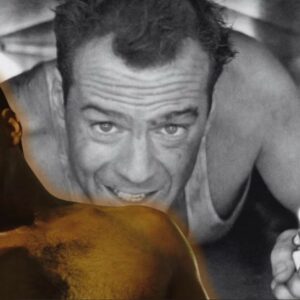Introduction
Queen Latifah, born Dana Elaine Owens in 1970, has cemented her status as one of the most multifaceted and influential entertainers in Hollywood. Her career, which spans over three decades, is a testament to her versatility, resilience, and unwavering commitment to both her craft and her values. From her beginnings in hip-hop to her domination of both the small and big screens, Queen Latifah has proven herself to be not just a performer, but a trailblazer. What sets her apart is her ability to seamlessly transition between various genres, from comedy to drama, action, and even musicals. She has not only selected scripts that challenge her as an actress but also those that resonate with her personal values, especially when it comes to empowering marginalized communities and championing diversity.
Queen Latifah’s reputation as a trailblazer in Hollywood is underscored by her role as one of the few African-American women who have successfully navigated such a wide array of genres, while also making a significant impact on the film industry’s landscape. Her diverse career choices reflect an astute awareness of market trends and personal aspirations, making her one of Hollywood’s most respected figures. This article explores Queen Latifah’s unique approach to script selection, her dedication to representing marginalized communities, and her ability to balance commercial success with artistic integrity.
1. Diverse Genre Choices
One of the defining aspects of Queen Latifah’s career is her ability to move effortlessly between genres. This versatility is a rarity in Hollywood, where many actors find themselves typecast into specific roles based on their image or previous performances. Latifah, however, has consistently chosen projects that allow her to explore a wide array of characters across multiple genres. For instance, her performance in Chicago (2002), a musical, showcases her impressive singing and dancing skills while also highlighting her ability to play complex roles. In the film, she portrays Matron Mama Morton, a corrupt yet charismatic prison matron, a role that required both strong comedic timing and dramatic gravitas. Her work in Chicago earned her an Academy Award nomination for Best Supporting Actress, proving that she was capable of thriving in a genre known for its larger-than-life characters and musical numbers.
In contrast, her role in Set It Off (1996) was a stark departure from the musical genre. The film, a gritty crime drama, sees Queen Latifah as a tough, street-smart woman involved in a bank robbery. Her portrayal of the character of Cleo was widely praised for its emotional depth and authenticity. Queen Latifah’s ability to tap into the complex emotions of a character like Cleo, who is both vulnerable and fiercely independent, shows her adaptability as an actress. The film itself has become a cult classic, celebrated for its raw portrayal of friendship and struggle.
Latifah’s comedic chops were on full display in Bringing Down the House (2003), where she starred opposite Steve Martin. In this comedy, she plays a convict trying to reconnect with her estranged daughter, leading to a series of humorous and heartwarming moments. Her performance as the witty and resourceful Charlene is a testament to her natural comedic timing and her ability to draw laughs while still portraying a character with depth and emotional complexity.
This fluid movement between genres is not a coincidence but rather a strategic decision by Latifah to challenge herself artistically while capitalizing on trends in the film industry. Each of these roles—whether in musical, crime drama, or comedy—allowed her to reach new audiences while keeping her performances fresh and exciting. Her script selection process reveals an understanding of her marketability, as well as an awareness of the evolving nature of the film industry. This versatility has made her one of the most sought-after actresses in Hollywood.
2. Character Empowerment and Representation
Beyond genre, Queen Latifah’s choice of roles often centers around themes of empowerment, particularly the empowerment of women, and especially women of color. In many of her films, Latifah has taken on roles that challenge stereotypes, break barriers, and uplift marginalized communities. A prime example is her performance in The Secret Life of Bees (2008), where she portrays August Boatwright, a wise and compassionate woman who helps guide the film’s young protagonist through personal struggles. Latifah’s portrayal of August is a beacon of strength and wisdom, emphasizing the importance of community, love, and resilience in the face of adversity.
Similarly, in Girls Trip (2017), Latifah plays a character named Sasha, a successful journalist who reconnects with her childhood friends on a wild trip to New Orleans. The film, a raunchy yet heartwarming comedy, explores themes of friendship, personal growth, and reclaiming one’s self-worth. The film is groundbreaking for its portrayal of African-American women enjoying their lives and supporting each other without the need for a romantic subplot. Latifah’s performance in Girls Trip was praised for its humor, authenticity, and warmth, contributing to the film’s massive success.
In Living Out Loud (1998), Latifah portrays a supportive friend to Holly Hunter’s character, a woman going through a divorce. Latifah’s character, a nightclub singer, represents a kind of independence and self-assurance that contrasts sharply with the other characters’ more fragile states. Through roles like these, Queen Latifah has been able to portray a wide range of powerful, multidimensional women who refuse to conform to society’s expectations of them.
These roles speak to Latifah’s desire to present women, particularly women of color, as complex, multifaceted individuals with their own agency and stories. By taking on roles that challenge societal norms and stereotypes, she has created a body of work that is both empowering and representative of the diverse experiences of women, especially those who are often underrepresented in mainstream media.
3. Collaboration with Directors and Writers
Another key aspect of Queen Latifah’s career is her ability to collaborate with directors and writers who share her passion for authenticity, social issues, and diversity. She has worked with several well-known filmmakers who value the importance of telling stories that are both meaningful and inclusive.
One such collaboration was with director Adam Shankman in the 2007 musical film Hairspray. In the film, Latifah plays Motormouth Maybelle, a larger-than-life character who runs a record store and is a strong advocate for racial integration. Hairspray is not only a celebration of music and dance but also a commentary on the social and racial struggles of the 1960s. Latifah’s role in the film helped to bring attention to issues of racism and body image, both of which are central to her advocacy work.
Similarly, her work on The Last Holiday (2006), directed by Wayne Wang, demonstrates her commitment to projects that combine entertainment with heart. In this comedy-drama, Latifah stars as Georgia Byrd, a woman who discovers that she has a terminal illness and sets off on a lavish vacation to live out her final days. The film is a heartwarming exploration of self-discovery and living life to the fullest, with Latifah’s performance bringing depth and grace to a story that could have easily veered into melodrama.
By aligning herself with directors and writers who share her values, Queen Latifah has ensured that the projects she chooses are not only commercially viable but also resonate with her personal beliefs in inclusion, diversity, and social change.
4. Balance of Commercial Success and Artistic Integrity
Queen Latifah has been able to balance the demands of commercial success with her commitment to artistic integrity, an ability that is often difficult to achieve in Hollywood. While many actors struggle to maintain their creative independence after finding commercial success, Latifah has found a way to work within the system while still pursuing her artistic goals.
One of her most successful projects in terms of commercial appeal is The Equalizer (2014), where she stars as Robyn McCall, a vigilante who seeks justice for those who cannot defend themselves. The film, based on the popular TV series, was a box-office hit and solidified Latifah’s ability to carry a major action franchise. Her portrayal of McCall was praised for its strength, confidence, and compassion—qualities that made her character relatable to a wide audience.
On the other hand, her role as Bessie Smith in the HBO biopic Bessie (2015) is an example of her dedication to artistic work that may not be as commercially mainstream but still has a profound impact. The film, which tells the story of the legendary blues singer, earned Latifah critical acclaim for her nuanced portrayal of Smith’s tumultuous life. The role allowed her to tap into her love of music and historical storytelling, proving that she can balance both commercial and critical success without compromising her values.
Queen Latifah’s ability to navigate the space between commercial blockbusters and smaller, more personal projects has allowed her to maintain her relevance in Hollywood while staying true to her artistic vision.
5. Personal Passion Projects
Queen Latifah’s career choices have also been guided by her personal interests and passions, which have often shaped the types of roles she takes on. As a producer, she has had the opportunity to create content that reflects her values and experiences. One of her most significant passion projects was The Queen Latifah Show (2013-2015), a daytime talk show that showcased her ability to connect with people from all walks of life. Through her show, Latifah not only entertained audiences but also highlighted social issues, personal growth, and cultural dialogue.
Additionally, her role in Bessie (2015) was both a professional and personal endeavor. Latifah, who is deeply passionate about music, not only starred in the film but also served as one of its producers. The project was an opportunity for her to explore the life of one of her musical idols while also producing a film that highlighted the challenges faced by African-American artists in the early 20th century.
Conclusion
Queen Latifah’s career has been defined by her ability to make bold, thoughtful, and meaningful choices in her script selection. Whether moving between genres or choosing roles that empower marginalized communities, she has remained steadfast in her commitment to both artistic excellence and social change. Her collaborations with like-minded directors and writers, her balance of commercial success with artistic integrity, and her personal passion projects have made her a respected figure in Hollywood. Queen Latifah’s influence extends beyond the screen, inspiring audiences and fellow artists alike through the diverse and impactful choices she makes in her career.





